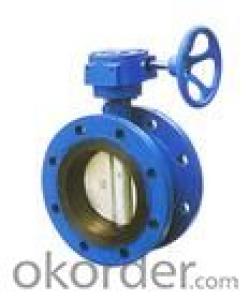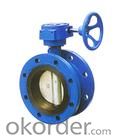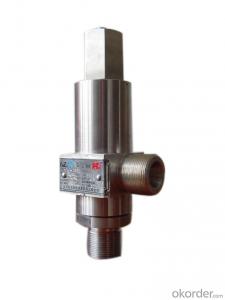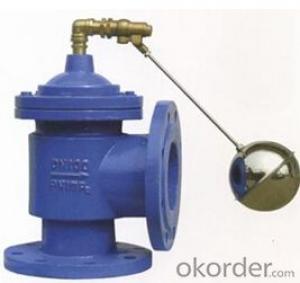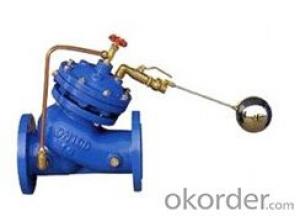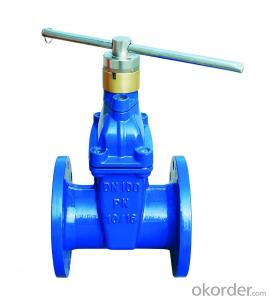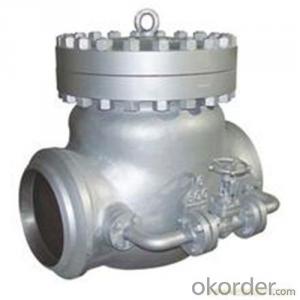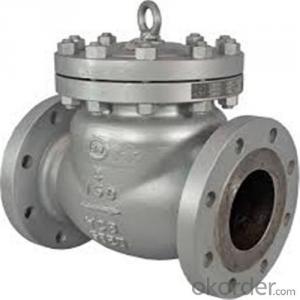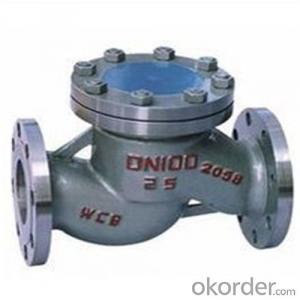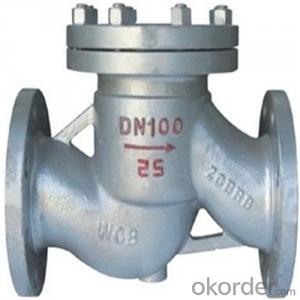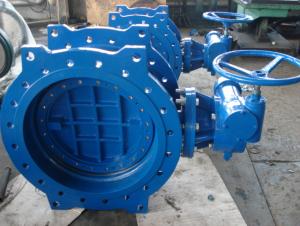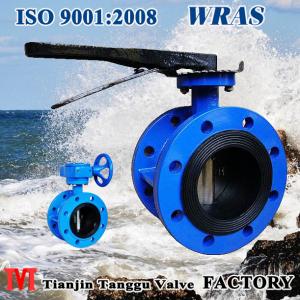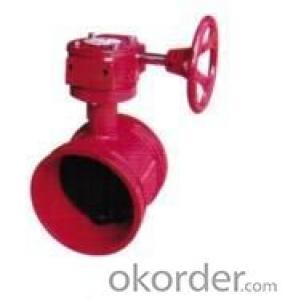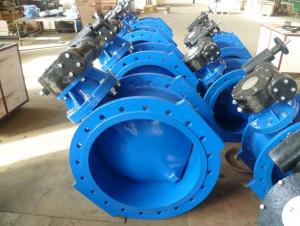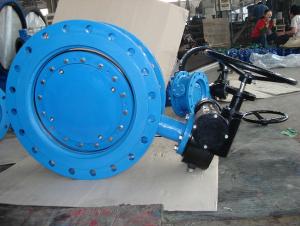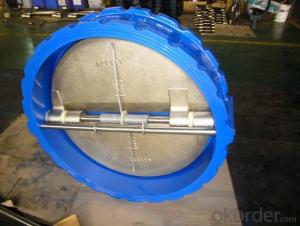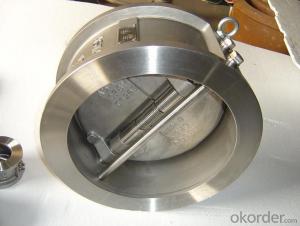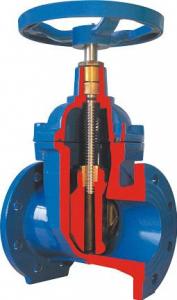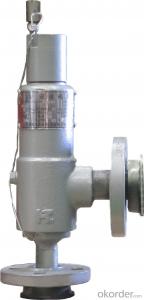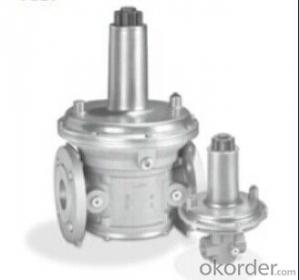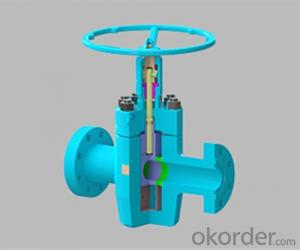Double flanged concentric butterfly valve
- Loading Port:
- China Main Port
- Payment Terms:
- TT OR LC
- Min Order Qty:
- -
- Supply Capability:
- -
OKorder Service Pledge
OKorder Financial Service
You Might Also Like
Specifications
Double flanged Double Eccentric Butterfly Valve
PN10/16/25
DN100 ~ DN2000
Technical Specifications
- Design and manufacture: EN593, EN1074-1 and 2
- Face to face dimension: EN558-1 Series 14 (DIN3202 F4)
EN558-1 Series 13 (BS5163)
- Flange dimensions and drillling: EN1092-2 PN10/16/25
- Size range: DN100 - DN2000
- Max. working pressure: 1.0/1.6/2.5 MPa
- Inspection test: EN12266
- Working temperature: -15°C to +80°C
- Suitable medium: water
Main Fetures
- Double eccentric disc reduces seal wear and torque
- Body seat ring is welded directly on the body
- Bi-directional flow and low head loss
- Disc sealing ring to be replaceable on pipeline without dismantling the valve
- Body and disc inside and outside epoxy powder coated (min. 250 microns)
- Opening and closing indicators are provided
- Coupling flange for electric actuator in compliance with ISO5211
- Gearbox and electric actuator operation available
Main Parts and Materials
Body and disc: ductile iron EN GJS500-7/400-15
Shafts: stainless steel AISI 420
Body seat ring: stainless steel AISI 304
Disc sealing ring: EPDM or NBR
Retaining ring: stainless steel or ductile iron
Shaft bearing: Du bushes (self lubricating bushes)
- Q: The tricuspid valve is closed: a. during the rapid filling of the ventriclesb. when the mitral valve is openc. during ejection of blood from the ventriclesHelp plzThank you!
- b, when the ventricle contracts the valve closes to prevent blood from moving back into the atrium.
- Q: We have a 2005 GMC Sierra 1/2 ton truck that has a check engine light on. The dealer checked the code and he told us we need a new Evap Vent Valve and clamp. The cost is over 500.00 with labor being most of the cost. Is this diffcult to change out? Im a very mechanical person. Also he said it would be ok to drive for now but could cause problems down the road. ????like what?My wife is getting ready to take a trip in it, should it be ok for awhile? Dont have 500+ to spend on it now.
- This Site Might Help You. RE: Evap vent valve? We have a 2005 GMC Sierra 1/2 ton truck that has a check engine light on. The dealer checked the code and he told us we need a new Evap Vent Valve and clamp. The cost is over 500.00 with labor being most of the cost. Is this diffcult to change out? Im a very mechanical person. Also he said it would...
- Q: I'm at school reading a mag and all the internet is blocked except yahoo. So i'm trying to figure out what the diff is between 3 angle versus 5 angle valve jobs.
- Im not familliar with a 3 valve per cylinder but it either has two intake valves and one exaust valve or vice versa. IN this case it should have nothing to do with speed. I hope this helps
- Q: i was told my egr valve needs to be replaced, so im wondering if the system cleaner will help at all. thanx
- well it depends if it needs to be replaced or just cleaned. shops wont tell you to get it clean because they want to chjarge u as much as possible. get sombody u know to clean it by taking it off and using a brush and degreaser. the fuel cleaner wont clean the egr valve it only cleans the combustion chamber.
- Q: I'm looking for a way to fix my noisy piston valves on my full sized Yamaha tuba. It makes a loud, metallic clang whenever any of the valves are pressed or released. Thanks!
- right this is what I did My truck is 2003 GMC sierra with approximately 112.000 miles that develpoed a noisy lifter. I asked around and offered a prior employer tip. This truck has the vortec 5.3 which I easily have study different posts that those autos tend to boost this equivalent style challenge. Pour a pair of quart of gas into your oil,particular I stated gas, run for 30-40 5 seconds. close off the motor this would possibly not restoration the challenge yet. . upload one extra quart of gas, permit it run 30-40 5 seconds close off the motor. permit stand 40 5 minutes to an hour The gas will injury down the gunk like no diverse. Drain oil and eliminate the filter out. What I did next replace into as quickly as positioned the oil plug in purely and added a pair of a million/2 of gallon of the pink potential degreaser down the hatch and permit that sit down for a stable hour. Then I drained it and guy did some nasty stuff come out. With the plug out I dumped one extra quart of gas down the hatch lower back to flush it. eliminate cap, dipstick and shelter the plug out and permit it breath for a staggering hour I switched to Valvoline synthetic mixture 5w-20 from pennzoil classic 5w-30 and have been given a wix filter out from a puralator. I stay in florida so I are actually not finding for the better weight oil. positioned the pug and filter out in, introduced the oil and ran the engine, in no longer as much as 30 seconds the noise replace into as quickly as long previous. I permit it run for slightly, close it down, then began the engine as quickly as extra in all probability 3 hours later The motor is whisper quiet, It hasn't run this quiet in years. wish this enables. i'm no longer particular if this attitude would artwork on diverse engines so use your judgement
- Q: does anyone have a bicuspid aortic valve and wrestle? my cardiologist told me that wrestling would put too much strain on my heart but i can feel that i'm fine when i wrestle so if you have a bicuspid aortic valve and wrestle or know anyone who has that disfunction and wrestles please let me know
- If your bicuspid aortic valve doesn't leak or is not stenosed, it should not be a significant problem.
- Q: What is a foot and check valve what's the difference between the two?
- A check valve is a mechanical device, a valve, that normally allows fluid or gas to flow through it in only one direction. A double check valve is often used as a backflow prevention device to keep potentially contaminated water from siphoning back into municipal water supply lines A foot valve is for use as inlet of suction pipe. A modified check valve that has a screen on the suction end to prevent debris from entering the pump or pipe. IIt protects against loss of prime, aids in priming the pump and protects the pump from large debris.
- Q: To control a double solenoid valve, what do you recommend to use in my PLC program .... Do you recommend to use the SetReset coils or to use the normal coils?
- You need to know how the solenoid valve operates. Some remain in position with no current to either coil. Others are designed to return to a center position when coil voltage is removed. Still others require sustained voltage to a coil to keep them from drifting to an undetermined position. NONE of the solenoid valves I have looked at will operate properly with voltage applied to both coils, so your PLC program will need interlocks to prevent this condition. Use of Set Reset coils is not really necessary unless you have other considerations which would make their use preferable. Sorry not to be more helpful, but in this case, knowing the application and hardware is essential..
- Q: my Hunter SVC VALVE will not work with my Lawn Genie Valve. Is this becaous the voltage is not matched? Hunter says it operates solenoids at 6-9 v DC // Lawn Genie says it is an 18 v DC solenoid. :-( my original Hunter Valve broke and I replaced it with the Lawn Genie. Should I get a Hunter Valve , or a Lawn Genie Controller at this point/ or is there something I have overlooked?.
- Something is incorrect. All valve solenoids and all timers are designed to work at 24 v DC It should make no difference which brand of clock or which brand of valve you are using. Now the actual solenoid which is the circular cylinder with the wires coming out of it that screws into the valve may not fit all brands of valves but you can buy the correct brand to fit your valve at any irrigation supplier. If your controller is working with at least one valve it should work with any valve you have installed. I would look at the wiring and see that they are correctly installed and connected especially at the valve. If one of the two wires is loose or connected wrong then you wont get the valve to operate. If you have a voltage meter I would test it with that. If not make sure at least one wire from each valve is connected to the white (or nuetral wire) out of the controller and the other valve wire is connected to one of the hot wires coming out of the controller. If one valve does not work try connecting a hot wire off a working valve to the non working valve and test it. If it works your problem is in the wire you disconnected. I constantly work on sprinkler systems and wiring is no. one problem. Incidently I cant find a SVC valve listed in the Hunter catalog did you get the letters mixed up?
- Q: what is engine valve timining ?
- The valve's are in the head or head's and they need to be lined up with your crankshaft in order for the engine to be in time , if they was'nt in time with the crank they would hit at the wrong time and your engine would be junk.
Send your message to us
Double flanged concentric butterfly valve
- Loading Port:
- China Main Port
- Payment Terms:
- TT OR LC
- Min Order Qty:
- -
- Supply Capability:
- -
OKorder Service Pledge
OKorder Financial Service
Similar products
Hot products
Hot Searches
Related keywords
